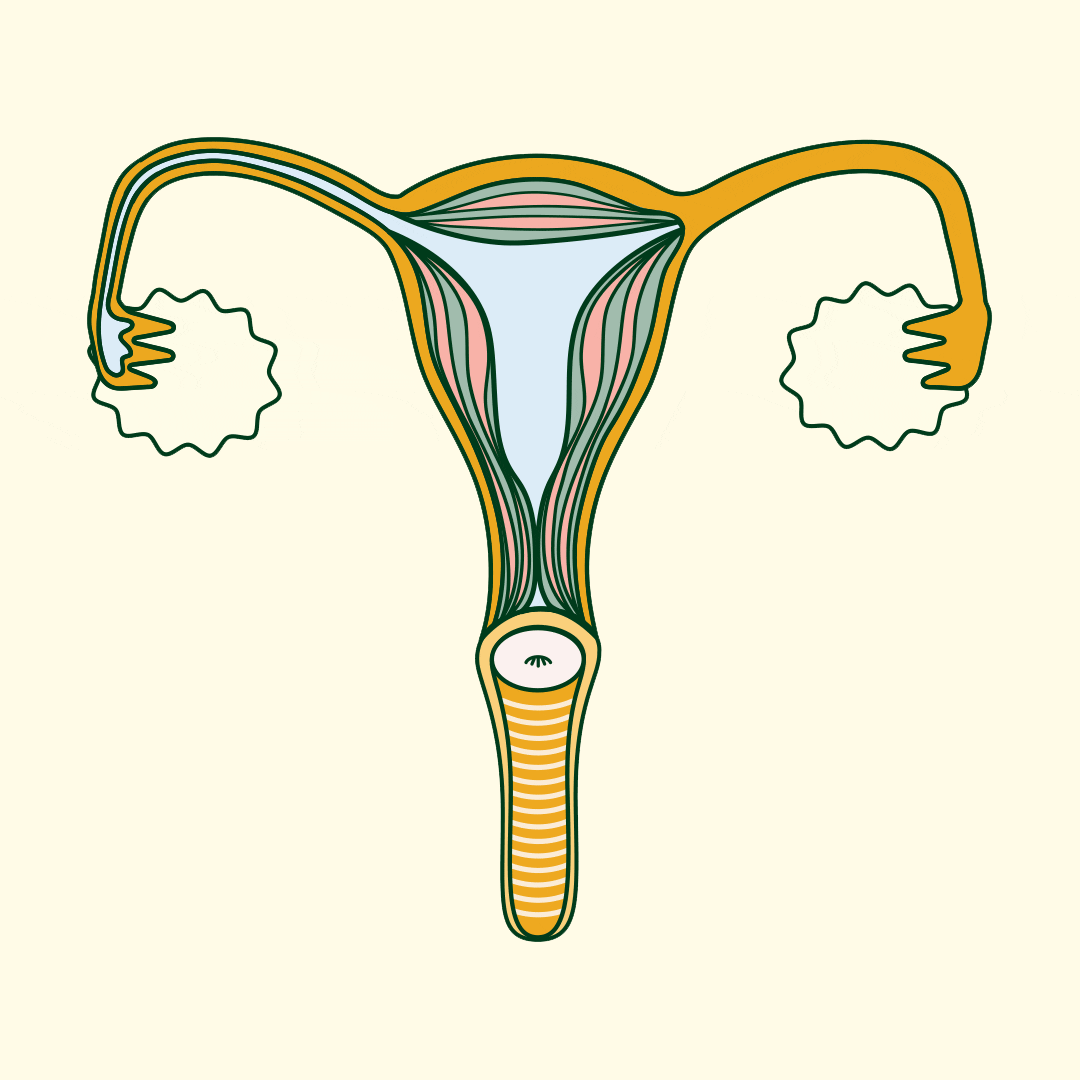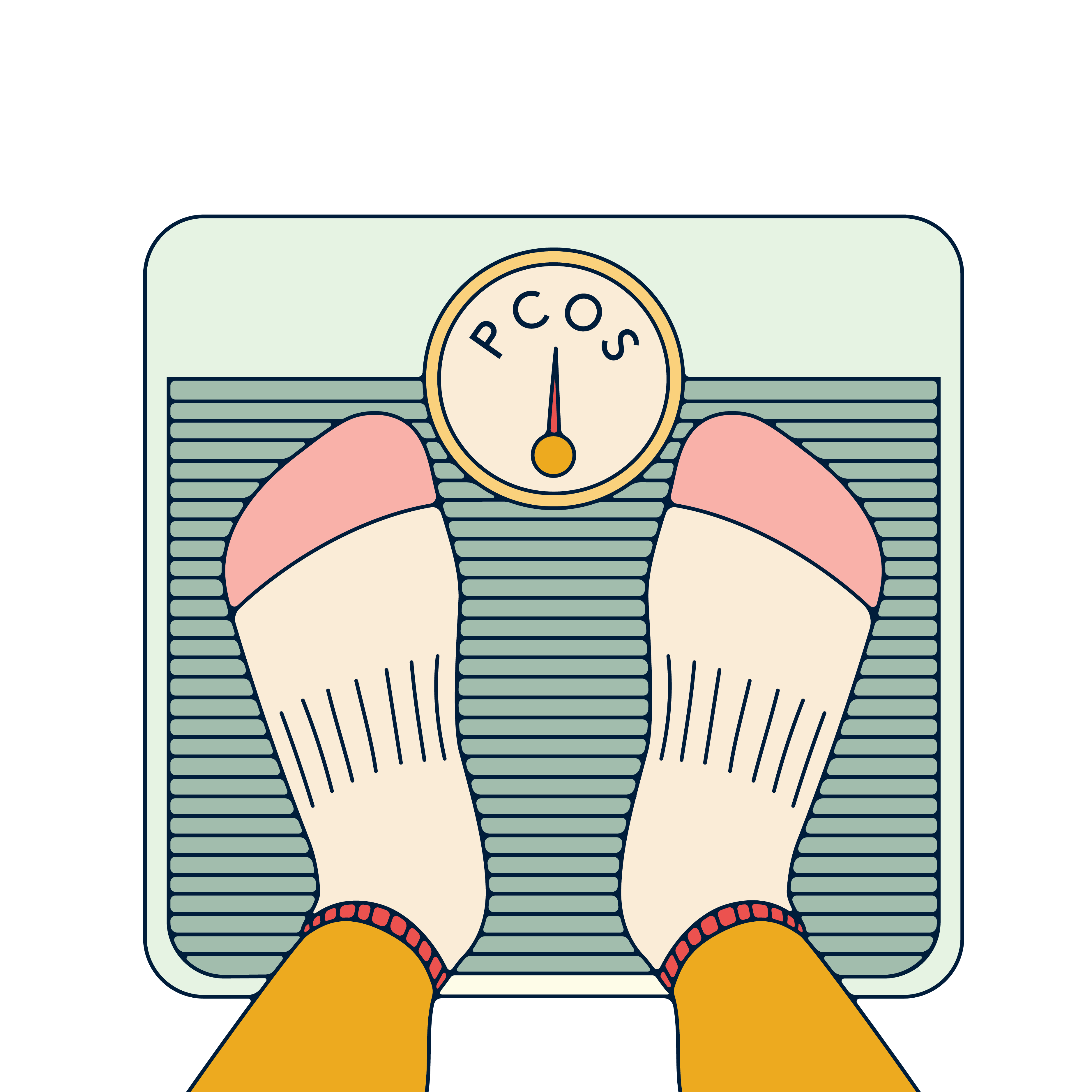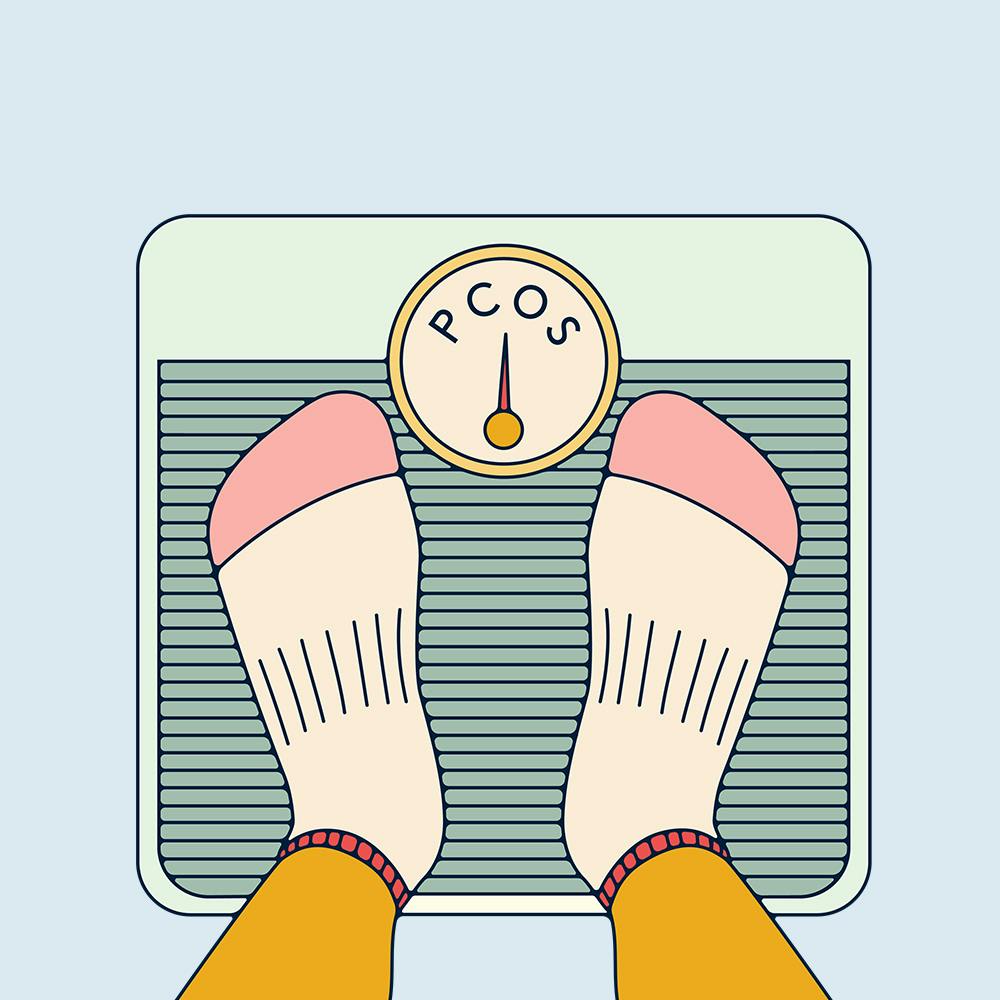Illustrated by Sabrina Bezerra
People with polycystic ovary syndrome (PCOS) can often experience debilitating symptoms, making them feel emotionally and physically drained on a daily basis.
This includes unexplained weight gain, excess hair growth, acne, depression, disrupted sleep, pelvic pain, irregular periods and fertility issues.
At the moment there is no cure for PCOS, but doctors often prescribe lifestyle and dietary changes to manage symptoms—the main one being to lose weight.
Excess weight is a common feature of PCOS, and up to 75% of people with PCOS are overweight. If you've been diagnosed with PCOS, chances are your doctor has advised you to lose weight.
Naturally, being overweight doesn't mean someone is unhealthy, but weight management is often (annoyingly) an effective way to ease PCOS symptoms. Yes, reducing body weight by 5-10% has been shown to significantly improve the emotional and physical symptoms of PCOS, but hearing such advice is frustrating, and quite frankly easier said than done! On top of that, health and weight can be mutually exclusive.

PCOS and weight management
Most people who have PCOS can attest to the pain and battle of losing weight. No matter how hard you might try, if you have PCOS your body resists letting go of those extra few pounds. The struggle is real. It's not as simple as calories in versus calories out—the logic being that if you expend more energy than you consume, you will lose weight.
The standard advice for weight management is to eat a “balanced diet” and exercise. Even for people who don’t have PCOS, this advice is ambiguous and not very helpful. Given the nature of PCOS, such advice is particularly challenging, as weight management strategies appear to be less effective in PCOS compared with non-PCOS individuals.
Certain factors antagonise weight gain
As PCOS is caused by a hormonal imbalance, insulin resistance is often associated with the disorder, making weight loss infinitely more difficult.
Before we delve in, here’s a little biology class refresher.... Insulin is a hormone that directs glucose (sugar) out of the blood and into cells to be used for energy—it controls blood glucose within an optimal range. For various reasons, cells can become resistant to insulin signalling, known as insulin resistance.
In an effort to keep blood glucose within a normal range, the pancreas overcompensates and produces more insulin. A surge of insulin causes blood glucose to plummet, and this fluctuation causes intense cravings for carbs and an increased appetite. To add fuel to the fire, insulin is also responsible for storing energy as fat.

Additionally, people with PCOS commonly have low grade inflammation, weight gain and insulin resistance. You can see where I'm going with this. Inflammation and insulin resistance propels an individual into a perpetual cycle of overeating (especially foods that cause high blood glucose), fat storage and weight gain. So it's not surprising that weight management feels impossible.
There is no doubt that weight management is an effective way of managing PCOS symptoms, but weight loss and weight maintenance are difficult to achieve, especially for the 'hormonally challenged".
If you are overweight, insulin resistance and inflammation are probably antagonising weight gain, as well as making PCOS symptoms worse.
Targeted strategies that improve insulin resistance and inflammation will lead to sustained weight management. In other words, the right diet and exercise can reshape hormones, making weight loss that little bit easier.
Diet and weight management
Research has shown that a low carb diet balances fertility hormones, improves insulin sensitivity, inflammation, and facilitates weight loss.
There are a small number of studies that have illustrated the beneficial effect of low-carb diets, specifically for PCOS. However, the drop out rate for very low-carb diets are generally higher, and there is a fine line between restriction and sustainability.
The right amount of carb consumption will be different for everyone, and unfortunately no research paper will be able to tell you what the right amount is for you.
Self-experimentation will help you understand what feels sustainable and makes you feel best. Listening to your body and its hunger cues is hard, but can be done with practise, patience, and a bit of mindfulness.
When it comes to health, there is often a lot of focus on what you shouldn't eat— restriction, basically—and it’s easy to forget about necessary nutrients that our bodies need.
Protein and fats are two essential macronutrients that are an absolute requirement for health, and we need to eat enough of them. They support normal cell and hormone functioning, which reduces inflammation and balances hormones.
Fats and proteins also have a low insulin response, which helps control cravings and hunger. In fact, studies have shown that PCOS individuals following a diet that is higher in protein and fat can lead to greater fat loss.
Recently there’s also been a lot more research into the role of gut health, and how it affects insulin sensitivity and body composition. Early evidence suggests that people with PCOS have fewer strains of healthy bacteria, so a diet including probiotics and prebiotics that promotes gut diversity may improve insulin sensitivity and help with weight loss. It’s early days, so more research needs to be done on the link between gut health and weight management.

Exercise and weight management
Another common bit of advice for those with PCOS is to exercise more (again, easier said than done).
Research has shown that exercise is a valuable tool for increasing insulin sensitivity, building muscle and promoting weight loss. That being said, people with PCOS don’t get as much out of exercise compared to people without PCOS.
Although there’s a limited amount of studies outlining the “ideal” exercise regime for PCOS, a combination of cardio and resistance training has been proven the most effective for improving insulin resistance, inflammation and weight.
Weight management is not the only solution
The bottom line is that weight management can be a valuable approach for improving PCOS symptoms, but we don’t have all the answers yet.
PCOS is an understudied condition and there's certainly more to it than meets the eye. It's not just skin deep—it goes further than "weight".
Since PCOS is a complex syndrome that is deeply intertwined with insulin resistance, inflammation and excess weight, it's a case of the chicken and the egg—which makes it difficult to pinpoint which one is responsible for developing a cascade of health issues.
Studies have also shown that improvements with insulin resistance and inflammation can alleviate PCOS symptoms, independent of weight loss. Bear this in mind, as you may not need to lose weight to see positive changes. This is especially important if you have or had disordered eating, as weight loss through restrictive eating and exercise could trigger a relapse.
If you've been diagnosed with PCOS and recommended to lose weight, please don't tackle it blindly. There's no "one size fits all", but there are strategies that help balance hormones, and make the process that little bit easier. Most importantly: it's your body and your life, so the decision is yours to make!






